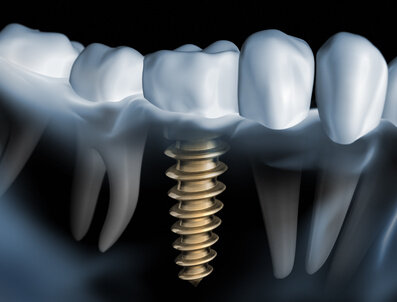Contents
Allergic reaction to titanium
There have been no scientifically proven cases of allergic reactions triggered explicitly by contact with titanium. The metal itself is virtually inert, which means that it does not react with the surrounding organic tissue or with other materials. Titanium is also very resistant to corrosion. This makes it perfect for use in the human body, since the body is over 60 per cent water.
So although you might see posts in online dental forums regarding patients’ fears of an allergic reaction, this is one myth we can totally bust.
If any incompatibility between the titanium and bodily tissues does become evident, this is usually caused by contamination, additives or alloys- none of which will be found in high-quality implants.
Titanium causes infertility
 As we’ve already mentioned, titanium is an inert material that triggers no reactions in the surrounding tissue. Thus, it has no influence whatsoever on the fertility of an implant bearer. The probability of a pregnancy remains the same on the side of both the mother and the father.
As we’ve already mentioned, titanium is an inert material that triggers no reactions in the surrounding tissue. Thus, it has no influence whatsoever on the fertility of an implant bearer. The probability of a pregnancy remains the same on the side of both the mother and the father.
It’s not possible to fly with implants
There is an old myth that patients with implants will no longer be allowed to travel via aeroplane. Why? Well, some people believe that the metal detector reacts to the titanium. But that’s not true at all.
A metal detector works by sending out electric currents. Metallic objects carried by the passengers become energised and retransmit their own electromagnetic fields, setting off a signal in the machine. But a titanium implant will not react in this way.
If you ever undergo a security check in which your implants are detected, be sure to show the security staff your plant pass. This will help to explain the situation.
Mini implants are a suitable option for any patient, no matter what their dental situation
As wonderful as it may sound – this myth is not correct. Yes, it’s true that modern implant technology enables implantologists to treat their patients in ways that would not have been possible a few years ago. But if the jaw bone is not fit to accommodate implants, even mini implants can’t help. In these kinds of cases, a bone augmentation is necessary.
Furthermore, mini implants are advisable only in rare cases and mostly in combination with regular ones. If mini implants are used by themselves, it can even be difficult to build a stable base for the dental prosthesis.
Implants need less dental care than natural teeth
Totally busted! Implants and implant-borne restorations need the same dental hygiene and care as natural teeth. Harmful bacteria and food remnants do still accumulate in the mouth and can lead to inflammation and / or other diseases. So: keep brushing and flossing your “new teeth”.
Have you heard a myth about implants and you want to know if it’s true? Post your question in the comments and we’ll get back to you soon.


